Module 6 War and Peace Reading Churchill课件(30张)2021-2022学年高中英语外研版选修六
文档属性
| 名称 | Module 6 War and Peace Reading Churchill课件(30张)2021-2022学年高中英语外研版选修六 |
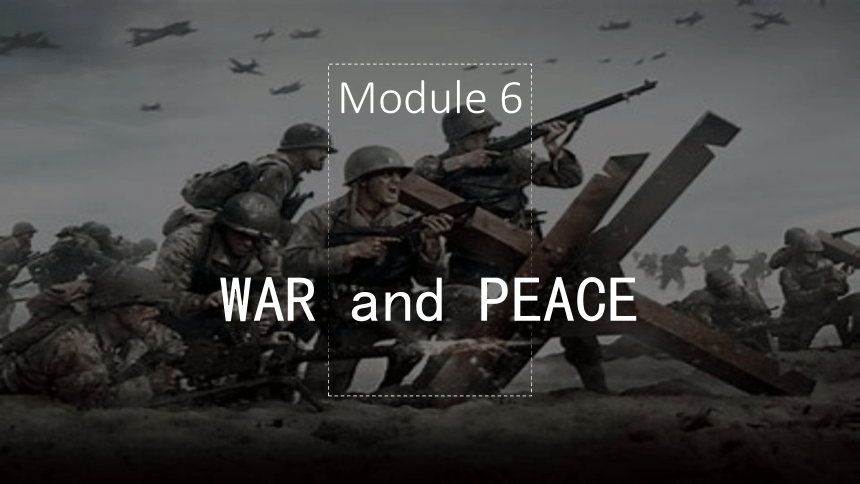
|
|
| 格式 | pptx | ||
| 文件大小 | 36.7MB | ||
| 资源类型 | 教案 | ||
| 版本资源 | 外研版 | ||
| 科目 | 英语 | ||
| 更新时间 | 2023-02-04 00:00:00 | ||
图片预览

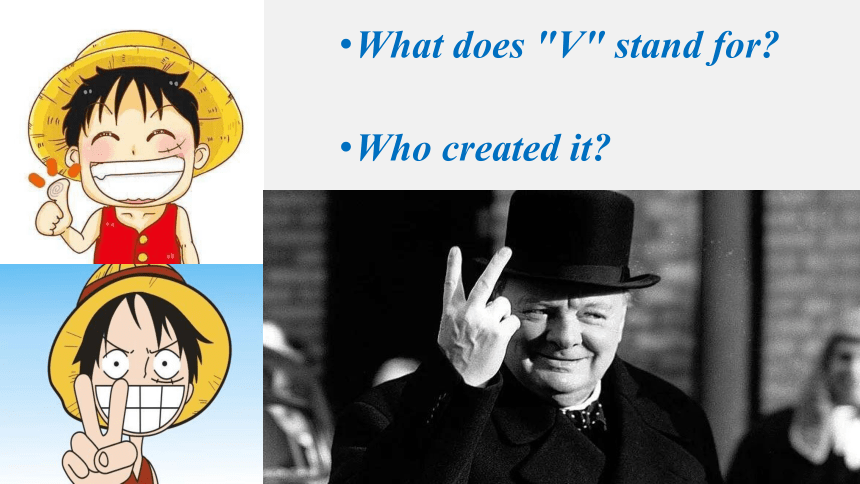
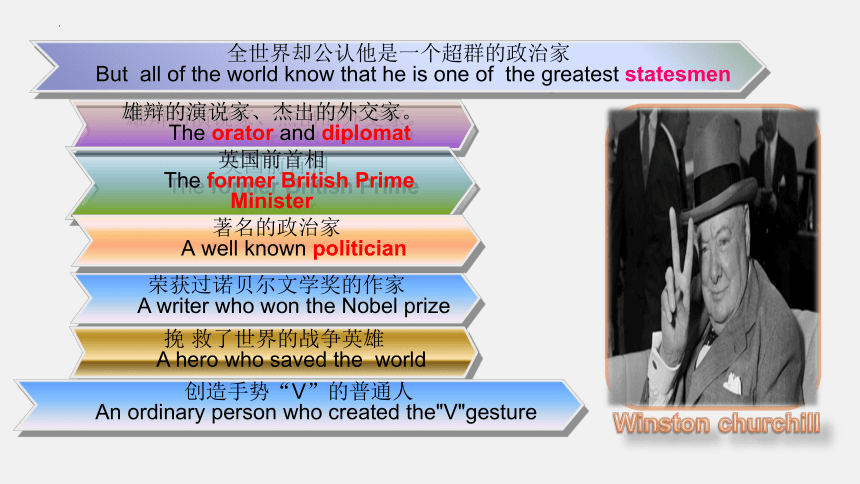

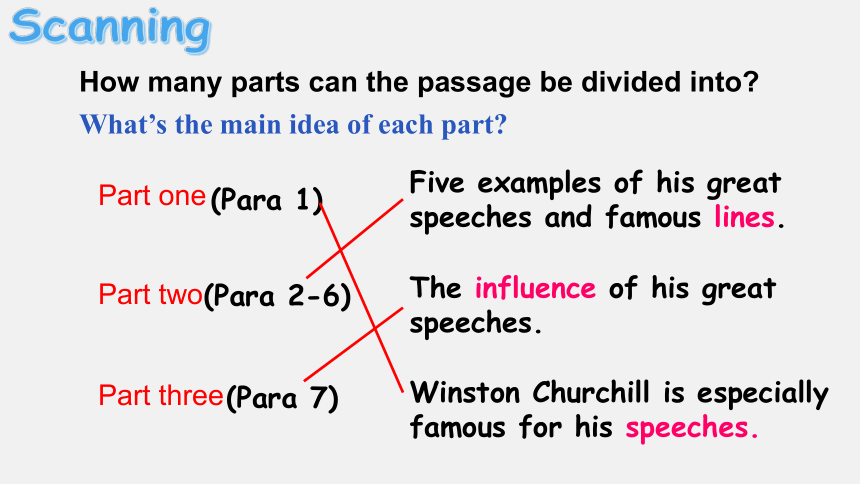

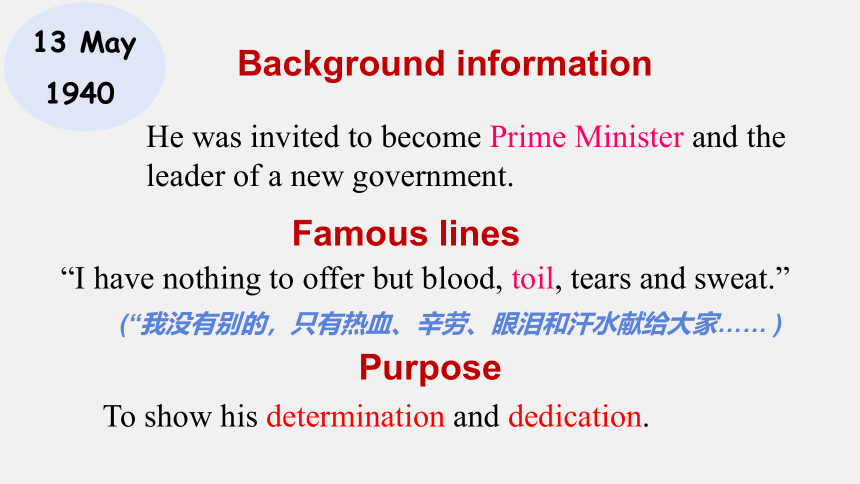
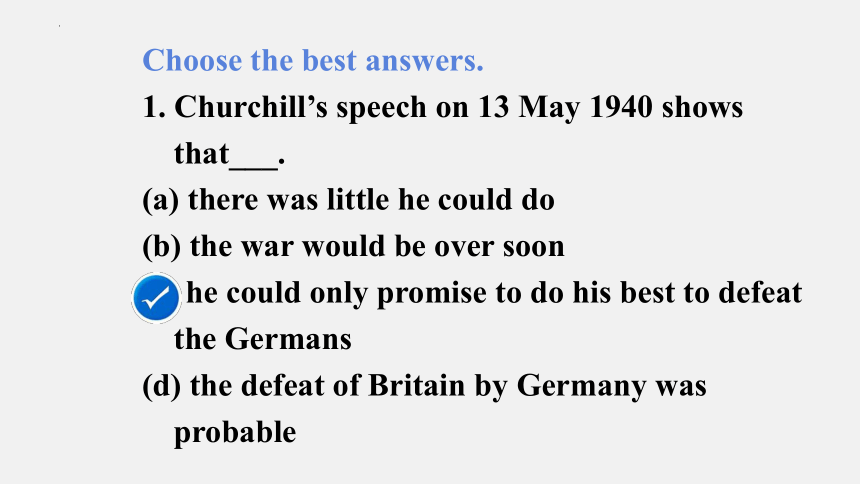
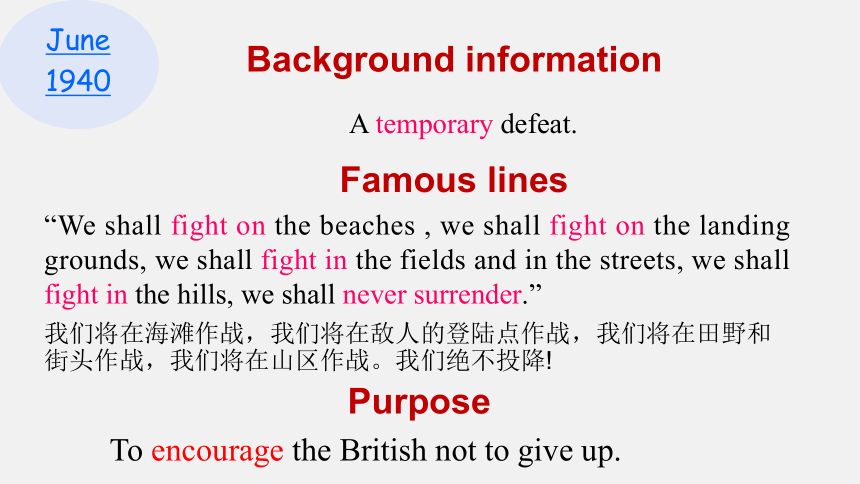
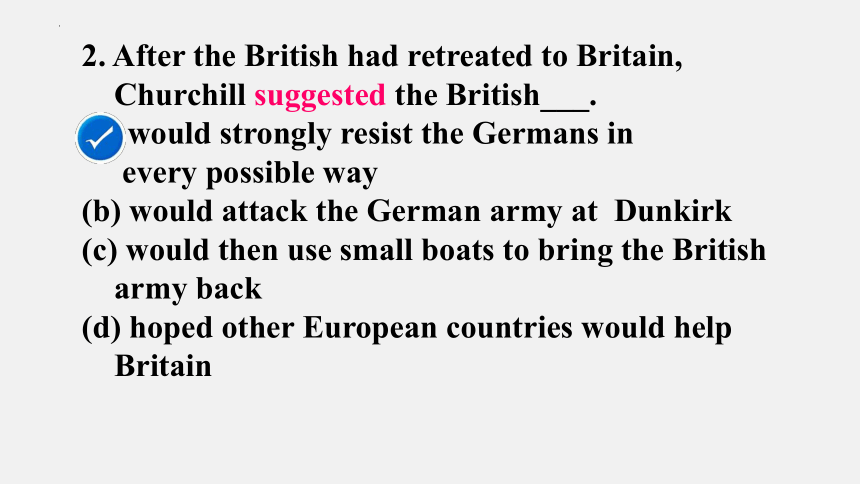
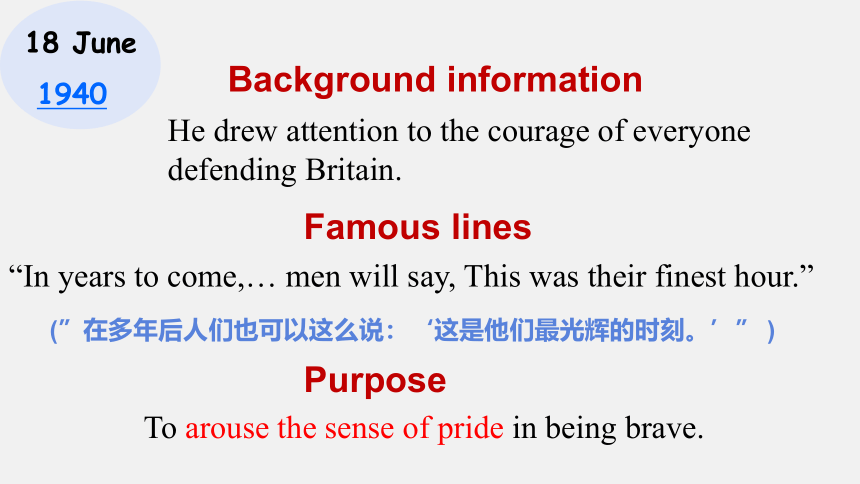

文档简介
(共30张PPT)
WAR and PEACE
Module 6
What does "V" stand for
Who created it
全世界却公认他是一个超群的政治家
But all of the world know that he is one of the greatest statesmen
雄辩的演说家、杰出的外交家。
The orator and diplomat
荣获过诺贝尔文学奖的作家
A writer who won the Nobel prize
英国前首相
The former British Prime Minister
著名的政治家
A well known politician
挽 救了世界的战争英雄
A hero who saved the world
Who is he
创造手势“V”的普通人
An ordinary person who created the"V"gesture
Winston Churchill’ s
Speeches
What’s the main idea of each part
Part one
Part two
Part three
Five examples of his great speeches and famous lines.
The influence of his great speeches.
Winston Churchill is especially famous for his speeches.
(Para 1)
(Para 2-6)
(Para 7)
Scanning
How many parts can the passage be divided into
Which is the topic sentence in the passage
How many of Churchill’s speeches are mentioned in the passage
In what order are the examples presented in the passage
Chronological(时间的)order
Spatial(空间的)order
The order of cause and effect
5
His speeches are still remembered and quoted today, and remain some of the finest examples of spoken English.
Read the passage & answer the following questions.
Background information
He was invited to become Prime Minister and the leader of a new government.
Famous lines
“I have nothing to offer but blood, toil, tears and sweat.”
13 May
1940
(“我没有别的,只有热血、辛劳、眼泪和汗水献给大家…… )
Purpose
To show his determination and dedication.
Choose the best answers.
1. Churchill’s speech on 13 May 1940 shows that___.
(a) there was little he could do
(b) the war would be over soon
(c) he could only promise to do his best to defeat the Germans
(d) the defeat of Britain by Germany was probable
Background information
A temporary defeat.
Famous lines
“We shall fight on the beaches , we shall fight on the landing grounds, we shall fight in the fields and in the streets, we shall fight in the hills, we shall never surrender.”
June
1940
我们将在海滩作战,我们将在敌人的登陆点作战,我们将在田野和街头作战,我们将在山区作战。我们绝不投降!
Purpose
To encourage the British not to give up.
2. After the British had retreated to Britain, Churchill suggested the British___.
would strongly resist the Germans in
every possible way
(b) would attack the German army at Dunkirk
(c) would then use small boats to bring the British army back
(d) hoped other European countries would help Britain
Background information
He drew attention to the courage of everyone defending Britain.
Famous lines
“In years to come,… men will say, This was their finest hour.”
18 June
1940
(”在多年后人们也可以这么说:‘这是他们最光辉的时刻。’” )
Purpose
To arouse the sense of pride in being brave.
“In years to come, men will say, this was their finest hour.”
1. The “men” refers to ____
A. the British people
B. everyone who defended Britain
2. The “finest hour” refers to ____
A. the happiest time in their life
B. the time when they defended Britain
3 “….This was their finest hour.” Suggests that___.
(a) the Battle of Britain was over quickly
(b) people will greatly admire everyone who defended Britain
(c) soldiers will be proud of what they had done
(d) the British were right not to surrender
Background information
A small number of pilots resisted the much larger German Air Force.
Famous lines
“Never in the field of human conflict was so much owed by so many to so few.”
20 August
1940
Purpose
以1475架飞机击退了3576架飞机的纳粹空军
Never in the field of human conflict was so much owed by so many to so few.
So much was never owed by so many to so few in the field of human conflict.
So many never owed so much to so few in the field of human conflict.
So many owe so much to so few in the war.
Background information
A small number of pilots resisted the much larger German Air Force.
Famous lines
“Never in the field of human conflict was so much owed by so many to so few.”
20 August
1940
“在人类战争的领域里,从来没有过这么多的人把这么大的贡献归功于这么少的人。”
Purpose
以1475架飞机击退了3576架飞机的纳粹空军
To express their gratitude to the pilots.
1. the “many” refers to _______.
A the British people
B the British pilots
2. the “much” refers to ______.
A success B defeats
3. the “few” refers to ______.
A the British people
B the British pilots
“Never in the field of human conflict was so much owed by so many to so few.”
A Germany defeat in North Africa.
“Now this is not the end. It is not even the beginning of the end. But it is, perhaps, the end of the beginning.”
现在还不是彻底的胜利。甚至都不算是胜利的开始。但是或许是开始的胜利。
10
November
1942
Background information
Famous lines
Purpose
To remind people to keep fighting.
“the end of the beginning” refers to _______.
The British started to win the war.
The war ended.
Why are the lines remembered even today
The techniques
of language
The skills of delivering a speech
Repetition and parallelism
Stress
The play on words
Passion
Eye contact
Body language
Pause
Discussion
1. 空军
2. 作为…出名
be well-known as
3. 因为…出名
be famous for
4. 首相
9. 撤退到
10. 出发
set out
11. 让人们关注
draw attention to
7. 众议院
8. 横扫北欧
12. 未来岁月中
in years to come
air force
Prime Minister
5. 下定决心做某事
be determined to do
6. 在交战状态中
be at war
the House of Commons
advance across northern Europe
retreat to
13. 少量
a small number of
14. 被迫做某事
be forced to do
15. 鼓舞某人做某事
inspire sb. to do
16. 面对
in the face of
表示否定的词放句首,主句要部分倒装。
谓语的一部分(通常是助动词/be动词/情态动词)位于主语前时,或添加助动词do,does或did,并将其置于主语之前。
如:not, never, seldom, little, hardly, rarely, at no time, in no way, by no means, under no circumstances,
not until 等。
“Never in the field of human conflict was so much owed by so many to so few.”
1. 我绝对不会屈服。
Never/In no way/ By no means/Under no
circumstances/At no time ____________.
shall I give in
2.我们从来没有听说过这件事。
___________ heard about the story.
Never have we
2.我们从来没有听说过这件事。
_____________ heard about the story.
3.直到妈妈回来我才开始做作业。
_____________________________
Never have we
Not until Mum came back did I begin to do my homework.
owe sb sth欠某人...
owe sth to sb把...归功于...
owe it to sb that 把...归功于...
1).他欠我1000元钱。
He owed me 1000 yuan.
“Never in the field of human conflict was so much owed by so many to so few.”
owe v. 欠;归因于,归功于
2).她把她的快速恢复归功于丈夫的
悉心照料。
3).他把他找到工作的功劳归功于他
的父亲。
She owed her rapid recovery to
her husband`s devoted care.
He owed it to his father that he got the job.
Thanks!
WAR and PEACE
Module 6
What does "V" stand for
Who created it
全世界却公认他是一个超群的政治家
But all of the world know that he is one of the greatest statesmen
雄辩的演说家、杰出的外交家。
The orator and diplomat
荣获过诺贝尔文学奖的作家
A writer who won the Nobel prize
英国前首相
The former British Prime Minister
著名的政治家
A well known politician
挽 救了世界的战争英雄
A hero who saved the world
Who is he
创造手势“V”的普通人
An ordinary person who created the"V"gesture
Winston Churchill’ s
Speeches
What’s the main idea of each part
Part one
Part two
Part three
Five examples of his great speeches and famous lines.
The influence of his great speeches.
Winston Churchill is especially famous for his speeches.
(Para 1)
(Para 2-6)
(Para 7)
Scanning
How many parts can the passage be divided into
Which is the topic sentence in the passage
How many of Churchill’s speeches are mentioned in the passage
In what order are the examples presented in the passage
Chronological(时间的)order
Spatial(空间的)order
The order of cause and effect
5
His speeches are still remembered and quoted today, and remain some of the finest examples of spoken English.
Read the passage & answer the following questions.
Background information
He was invited to become Prime Minister and the leader of a new government.
Famous lines
“I have nothing to offer but blood, toil, tears and sweat.”
13 May
1940
(“我没有别的,只有热血、辛劳、眼泪和汗水献给大家…… )
Purpose
To show his determination and dedication.
Choose the best answers.
1. Churchill’s speech on 13 May 1940 shows that___.
(a) there was little he could do
(b) the war would be over soon
(c) he could only promise to do his best to defeat the Germans
(d) the defeat of Britain by Germany was probable
Background information
A temporary defeat.
Famous lines
“We shall fight on the beaches , we shall fight on the landing grounds, we shall fight in the fields and in the streets, we shall fight in the hills, we shall never surrender.”
June
1940
我们将在海滩作战,我们将在敌人的登陆点作战,我们将在田野和街头作战,我们将在山区作战。我们绝不投降!
Purpose
To encourage the British not to give up.
2. After the British had retreated to Britain, Churchill suggested the British___.
would strongly resist the Germans in
every possible way
(b) would attack the German army at Dunkirk
(c) would then use small boats to bring the British army back
(d) hoped other European countries would help Britain
Background information
He drew attention to the courage of everyone defending Britain.
Famous lines
“In years to come,… men will say, This was their finest hour.”
18 June
1940
(”在多年后人们也可以这么说:‘这是他们最光辉的时刻。’” )
Purpose
To arouse the sense of pride in being brave.
“In years to come, men will say, this was their finest hour.”
1. The “men” refers to ____
A. the British people
B. everyone who defended Britain
2. The “finest hour” refers to ____
A. the happiest time in their life
B. the time when they defended Britain
3 “….This was their finest hour.” Suggests that___.
(a) the Battle of Britain was over quickly
(b) people will greatly admire everyone who defended Britain
(c) soldiers will be proud of what they had done
(d) the British were right not to surrender
Background information
A small number of pilots resisted the much larger German Air Force.
Famous lines
“Never in the field of human conflict was so much owed by so many to so few.”
20 August
1940
Purpose
以1475架飞机击退了3576架飞机的纳粹空军
Never in the field of human conflict was so much owed by so many to so few.
So much was never owed by so many to so few in the field of human conflict.
So many never owed so much to so few in the field of human conflict.
So many owe so much to so few in the war.
Background information
A small number of pilots resisted the much larger German Air Force.
Famous lines
“Never in the field of human conflict was so much owed by so many to so few.”
20 August
1940
“在人类战争的领域里,从来没有过这么多的人把这么大的贡献归功于这么少的人。”
Purpose
以1475架飞机击退了3576架飞机的纳粹空军
To express their gratitude to the pilots.
1. the “many” refers to _______.
A the British people
B the British pilots
2. the “much” refers to ______.
A success B defeats
3. the “few” refers to ______.
A the British people
B the British pilots
“Never in the field of human conflict was so much owed by so many to so few.”
A Germany defeat in North Africa.
“Now this is not the end. It is not even the beginning of the end. But it is, perhaps, the end of the beginning.”
现在还不是彻底的胜利。甚至都不算是胜利的开始。但是或许是开始的胜利。
10
November
1942
Background information
Famous lines
Purpose
To remind people to keep fighting.
“the end of the beginning” refers to _______.
The British started to win the war.
The war ended.
Why are the lines remembered even today
The techniques
of language
The skills of delivering a speech
Repetition and parallelism
Stress
The play on words
Passion
Eye contact
Body language
Pause
Discussion
1. 空军
2. 作为…出名
be well-known as
3. 因为…出名
be famous for
4. 首相
9. 撤退到
10. 出发
set out
11. 让人们关注
draw attention to
7. 众议院
8. 横扫北欧
12. 未来岁月中
in years to come
air force
Prime Minister
5. 下定决心做某事
be determined to do
6. 在交战状态中
be at war
the House of Commons
advance across northern Europe
retreat to
13. 少量
a small number of
14. 被迫做某事
be forced to do
15. 鼓舞某人做某事
inspire sb. to do
16. 面对
in the face of
表示否定的词放句首,主句要部分倒装。
谓语的一部分(通常是助动词/be动词/情态动词)位于主语前时,或添加助动词do,does或did,并将其置于主语之前。
如:not, never, seldom, little, hardly, rarely, at no time, in no way, by no means, under no circumstances,
not until 等。
“Never in the field of human conflict was so much owed by so many to so few.”
1. 我绝对不会屈服。
Never/In no way/ By no means/Under no
circumstances/At no time ____________.
shall I give in
2.我们从来没有听说过这件事。
___________ heard about the story.
Never have we
2.我们从来没有听说过这件事。
_____________ heard about the story.
3.直到妈妈回来我才开始做作业。
_____________________________
Never have we
Not until Mum came back did I begin to do my homework.
owe sb sth欠某人...
owe sth to sb把...归功于...
owe it to sb that 把...归功于...
1).他欠我1000元钱。
He owed me 1000 yuan.
“Never in the field of human conflict was so much owed by so many to so few.”
owe v. 欠;归因于,归功于
2).她把她的快速恢复归功于丈夫的
悉心照料。
3).他把他找到工作的功劳归功于他
的父亲。
She owed her rapid recovery to
her husband`s devoted care.
He owed it to his father that he got the job.
Thanks!
